PESTLE and Porter's Analysis: Strategic Recommendations for Suzuki SG
VerifiedAdded on 2023/06/11
|9
|2714
|70
Report
AI Summary
This report provides a comprehensive analysis of Suzuki's external environment in Singapore using the PESTLE and Porter's Five Forces frameworks. It begins by introducing Suzuki and its operations in Singapore, followed by a detailed PESTLE analysis covering political, economic, social, technological, environmental, and legal factors impacting the company. The report then employs Porter's Five Forces to assess the competitive intensity of the automotive industry, examining competitive rivalry, bargaining power of customers and suppliers, threats of substitutes, and threats of new entrants. Based on these analyses, the report offers strategic recommendations for Suzuki to improve its performance in the Singaporean market, focusing on addressing labor deficiencies, adapting to evolving consumer values and technological advancements, enhancing customer engagement, and promoting environmentally friendly practices. The conclusion summarizes the competitive landscape and Suzuki's position within it, highlighting the need for continuous adaptation and strategic alignment to maintain its leadership in the Singapore automotive sector. Desklib offers a wide array of similar solved assignments and past papers for students.
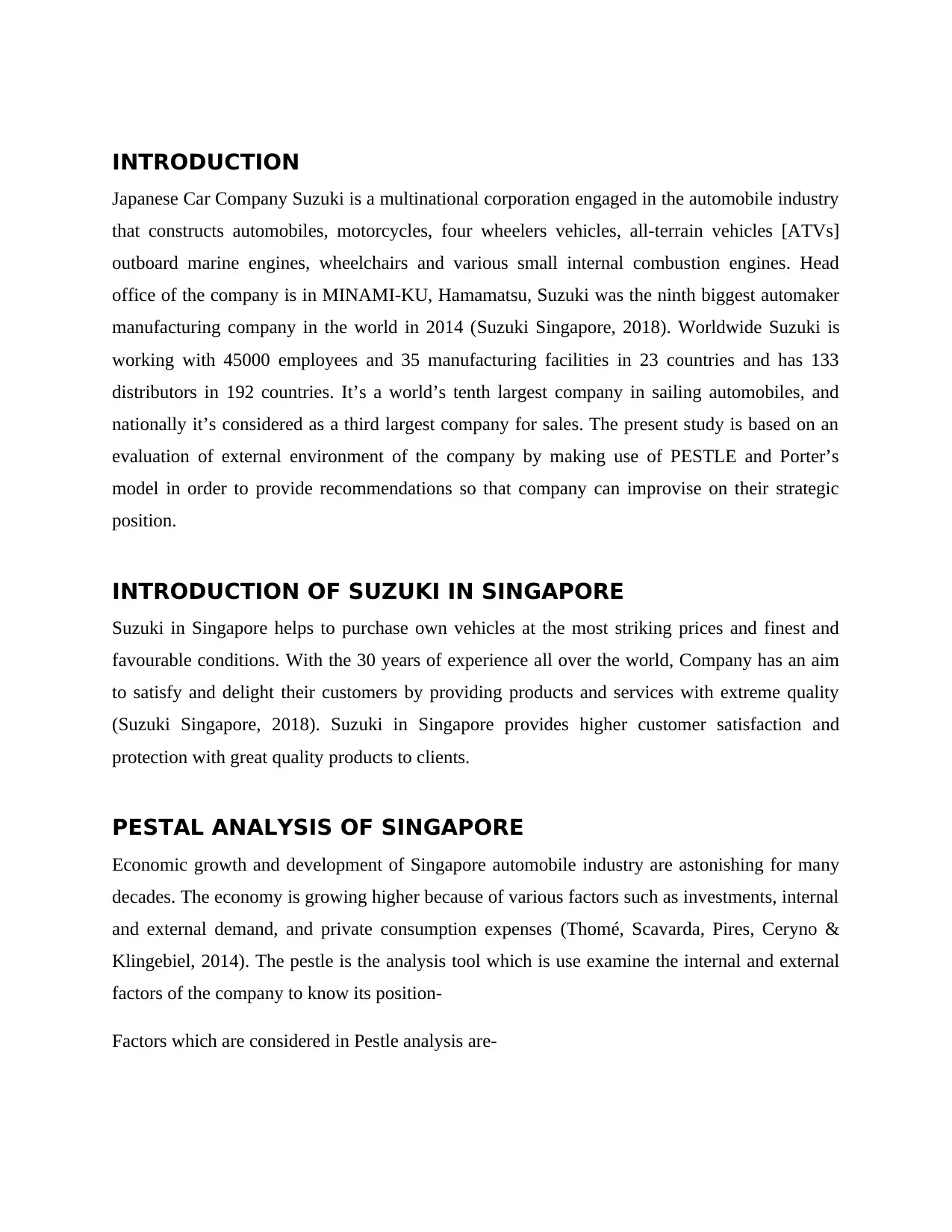
INTRODUCTION
Japanese Car Company Suzuki is a multinational corporation engaged in the automobile industry
that constructs automobiles, motorcycles, four wheelers vehicles, all-terrain vehicles [ATVs]
outboard marine engines, wheelchairs and various small internal combustion engines. Head
office of the company is in MINAMI-KU, Hamamatsu, Suzuki was the ninth biggest automaker
manufacturing company in the world in 2014 (Suzuki Singapore, 2018). Worldwide Suzuki is
working with 45000 employees and 35 manufacturing facilities in 23 countries and has 133
distributors in 192 countries. It’s a world’s tenth largest company in sailing automobiles, and
nationally it’s considered as a third largest company for sales. The present study is based on an
evaluation of external environment of the company by making use of PESTLE and Porter’s
model in order to provide recommendations so that company can improvise on their strategic
position.
INTRODUCTION OF SUZUKI IN SINGAPORE
Suzuki in Singapore helps to purchase own vehicles at the most striking prices and finest and
favourable conditions. With the 30 years of experience all over the world, Company has an aim
to satisfy and delight their customers by providing products and services with extreme quality
(Suzuki Singapore, 2018). Suzuki in Singapore provides higher customer satisfaction and
protection with great quality products to clients.
PESTAL ANALYSIS OF SINGAPORE
Economic growth and development of Singapore automobile industry are astonishing for many
decades. The economy is growing higher because of various factors such as investments, internal
and external demand, and private consumption expenses (Thomé, Scavarda, Pires, Ceryno &
Klingebiel, 2014). The pestle is the analysis tool which is use examine the internal and external
factors of the company to know its position-
Factors which are considered in Pestle analysis are-
Japanese Car Company Suzuki is a multinational corporation engaged in the automobile industry
that constructs automobiles, motorcycles, four wheelers vehicles, all-terrain vehicles [ATVs]
outboard marine engines, wheelchairs and various small internal combustion engines. Head
office of the company is in MINAMI-KU, Hamamatsu, Suzuki was the ninth biggest automaker
manufacturing company in the world in 2014 (Suzuki Singapore, 2018). Worldwide Suzuki is
working with 45000 employees and 35 manufacturing facilities in 23 countries and has 133
distributors in 192 countries. It’s a world’s tenth largest company in sailing automobiles, and
nationally it’s considered as a third largest company for sales. The present study is based on an
evaluation of external environment of the company by making use of PESTLE and Porter’s
model in order to provide recommendations so that company can improvise on their strategic
position.
INTRODUCTION OF SUZUKI IN SINGAPORE
Suzuki in Singapore helps to purchase own vehicles at the most striking prices and finest and
favourable conditions. With the 30 years of experience all over the world, Company has an aim
to satisfy and delight their customers by providing products and services with extreme quality
(Suzuki Singapore, 2018). Suzuki in Singapore provides higher customer satisfaction and
protection with great quality products to clients.
PESTAL ANALYSIS OF SINGAPORE
Economic growth and development of Singapore automobile industry are astonishing for many
decades. The economy is growing higher because of various factors such as investments, internal
and external demand, and private consumption expenses (Thomé, Scavarda, Pires, Ceryno &
Klingebiel, 2014). The pestle is the analysis tool which is use examine the internal and external
factors of the company to know its position-
Factors which are considered in Pestle analysis are-
Paraphrase This Document
Need a fresh take? Get an instant paraphrase of this document with our AI Paraphraser
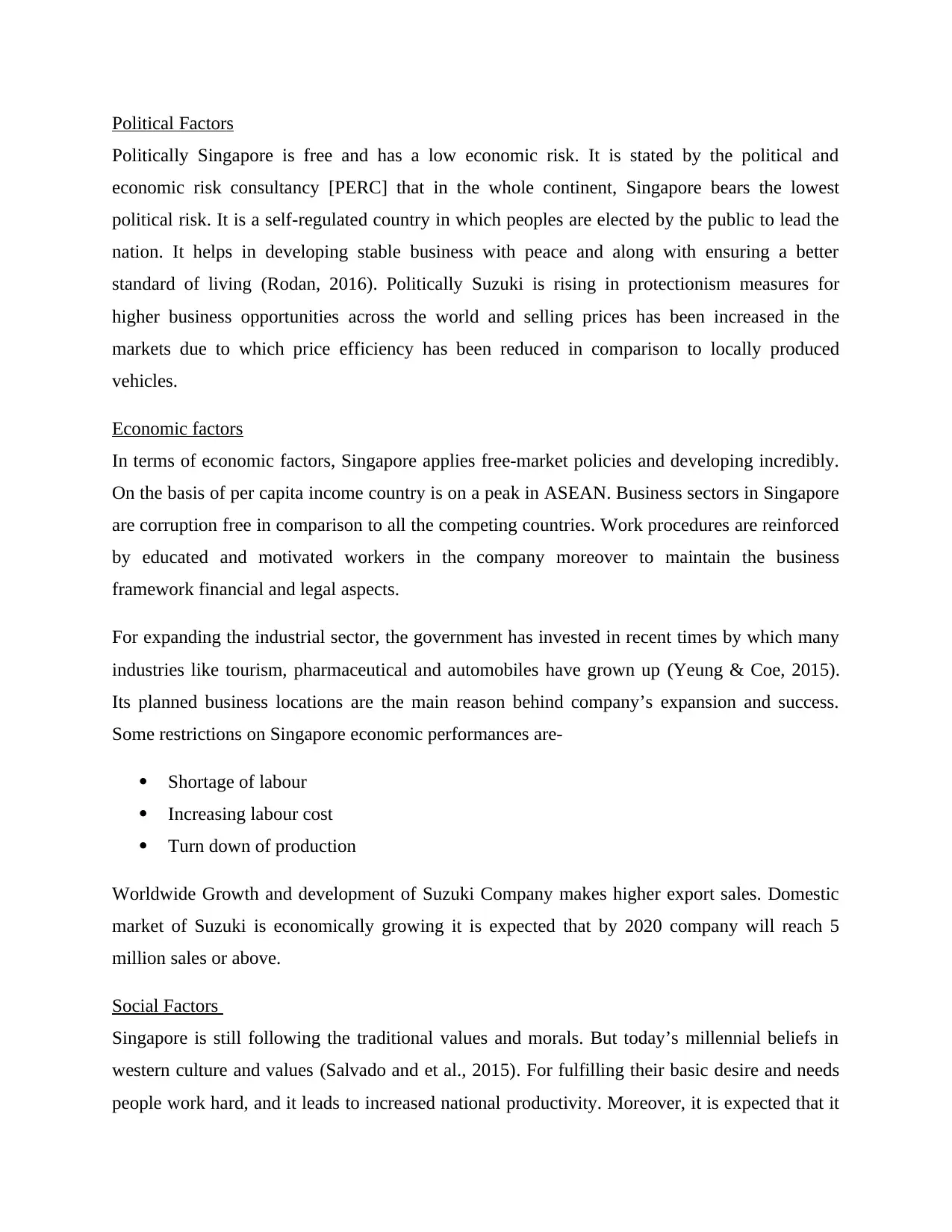
Political Factors
Politically Singapore is free and has a low economic risk. It is stated by the political and
economic risk consultancy [PERC] that in the whole continent, Singapore bears the lowest
political risk. It is a self-regulated country in which peoples are elected by the public to lead the
nation. It helps in developing stable business with peace and along with ensuring a better
standard of living (Rodan, 2016). Politically Suzuki is rising in protectionism measures for
higher business opportunities across the world and selling prices has been increased in the
markets due to which price efficiency has been reduced in comparison to locally produced
vehicles.
Economic factors
In terms of economic factors, Singapore applies free-market policies and developing incredibly.
On the basis of per capita income country is on a peak in ASEAN. Business sectors in Singapore
are corruption free in comparison to all the competing countries. Work procedures are reinforced
by educated and motivated workers in the company moreover to maintain the business
framework financial and legal aspects.
For expanding the industrial sector, the government has invested in recent times by which many
industries like tourism, pharmaceutical and automobiles have grown up (Yeung & Coe, 2015).
Its planned business locations are the main reason behind company’s expansion and success.
Some restrictions on Singapore economic performances are-
Shortage of labour
Increasing labour cost
Turn down of production
Worldwide Growth and development of Suzuki Company makes higher export sales. Domestic
market of Suzuki is economically growing it is expected that by 2020 company will reach 5
million sales or above.
Social Factors
Singapore is still following the traditional values and morals. But today’s millennial beliefs in
western culture and values (Salvado and et al., 2015). For fulfilling their basic desire and needs
people work hard, and it leads to increased national productivity. Moreover, it is expected that it
Politically Singapore is free and has a low economic risk. It is stated by the political and
economic risk consultancy [PERC] that in the whole continent, Singapore bears the lowest
political risk. It is a self-regulated country in which peoples are elected by the public to lead the
nation. It helps in developing stable business with peace and along with ensuring a better
standard of living (Rodan, 2016). Politically Suzuki is rising in protectionism measures for
higher business opportunities across the world and selling prices has been increased in the
markets due to which price efficiency has been reduced in comparison to locally produced
vehicles.
Economic factors
In terms of economic factors, Singapore applies free-market policies and developing incredibly.
On the basis of per capita income country is on a peak in ASEAN. Business sectors in Singapore
are corruption free in comparison to all the competing countries. Work procedures are reinforced
by educated and motivated workers in the company moreover to maintain the business
framework financial and legal aspects.
For expanding the industrial sector, the government has invested in recent times by which many
industries like tourism, pharmaceutical and automobiles have grown up (Yeung & Coe, 2015).
Its planned business locations are the main reason behind company’s expansion and success.
Some restrictions on Singapore economic performances are-
Shortage of labour
Increasing labour cost
Turn down of production
Worldwide Growth and development of Suzuki Company makes higher export sales. Domestic
market of Suzuki is economically growing it is expected that by 2020 company will reach 5
million sales or above.
Social Factors
Singapore is still following the traditional values and morals. But today’s millennial beliefs in
western culture and values (Salvado and et al., 2015). For fulfilling their basic desire and needs
people work hard, and it leads to increased national productivity. Moreover, it is expected that it
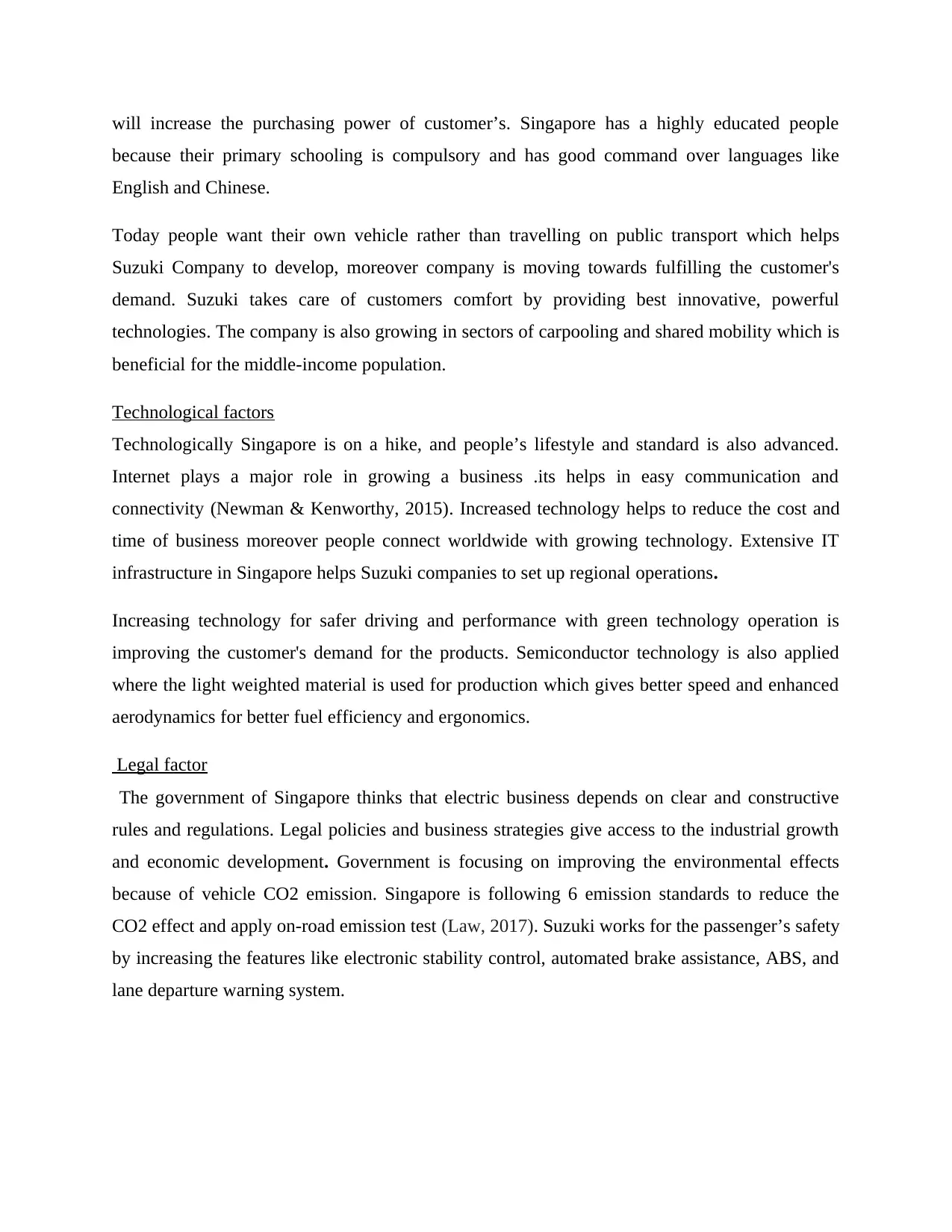
will increase the purchasing power of customer’s. Singapore has a highly educated people
because their primary schooling is compulsory and has good command over languages like
English and Chinese.
Today people want their own vehicle rather than travelling on public transport which helps
Suzuki Company to develop, moreover company is moving towards fulfilling the customer's
demand. Suzuki takes care of customers comfort by providing best innovative, powerful
technologies. The company is also growing in sectors of carpooling and shared mobility which is
beneficial for the middle-income population.
Technological factors
Technologically Singapore is on a hike, and people’s lifestyle and standard is also advanced.
Internet plays a major role in growing a business .its helps in easy communication and
connectivity (Newman & Kenworthy, 2015). Increased technology helps to reduce the cost and
time of business moreover people connect worldwide with growing technology. Extensive IT
infrastructure in Singapore helps Suzuki companies to set up regional operations.
Increasing technology for safer driving and performance with green technology operation is
improving the customer's demand for the products. Semiconductor technology is also applied
where the light weighted material is used for production which gives better speed and enhanced
aerodynamics for better fuel efficiency and ergonomics.
Legal factor
The government of Singapore thinks that electric business depends on clear and constructive
rules and regulations. Legal policies and business strategies give access to the industrial growth
and economic development. Government is focusing on improving the environmental effects
because of vehicle CO2 emission. Singapore is following 6 emission standards to reduce the
CO2 effect and apply on-road emission test (Law, 2017). Suzuki works for the passenger’s safety
by increasing the features like electronic stability control, automated brake assistance, ABS, and
lane departure warning system.
because their primary schooling is compulsory and has good command over languages like
English and Chinese.
Today people want their own vehicle rather than travelling on public transport which helps
Suzuki Company to develop, moreover company is moving towards fulfilling the customer's
demand. Suzuki takes care of customers comfort by providing best innovative, powerful
technologies. The company is also growing in sectors of carpooling and shared mobility which is
beneficial for the middle-income population.
Technological factors
Technologically Singapore is on a hike, and people’s lifestyle and standard is also advanced.
Internet plays a major role in growing a business .its helps in easy communication and
connectivity (Newman & Kenworthy, 2015). Increased technology helps to reduce the cost and
time of business moreover people connect worldwide with growing technology. Extensive IT
infrastructure in Singapore helps Suzuki companies to set up regional operations.
Increasing technology for safer driving and performance with green technology operation is
improving the customer's demand for the products. Semiconductor technology is also applied
where the light weighted material is used for production which gives better speed and enhanced
aerodynamics for better fuel efficiency and ergonomics.
Legal factor
The government of Singapore thinks that electric business depends on clear and constructive
rules and regulations. Legal policies and business strategies give access to the industrial growth
and economic development. Government is focusing on improving the environmental effects
because of vehicle CO2 emission. Singapore is following 6 emission standards to reduce the
CO2 effect and apply on-road emission test (Law, 2017). Suzuki works for the passenger’s safety
by increasing the features like electronic stability control, automated brake assistance, ABS, and
lane departure warning system.
⊘ This is a preview!⊘
Do you want full access?
Subscribe today to unlock all pages.

Trusted by 1+ million students worldwide
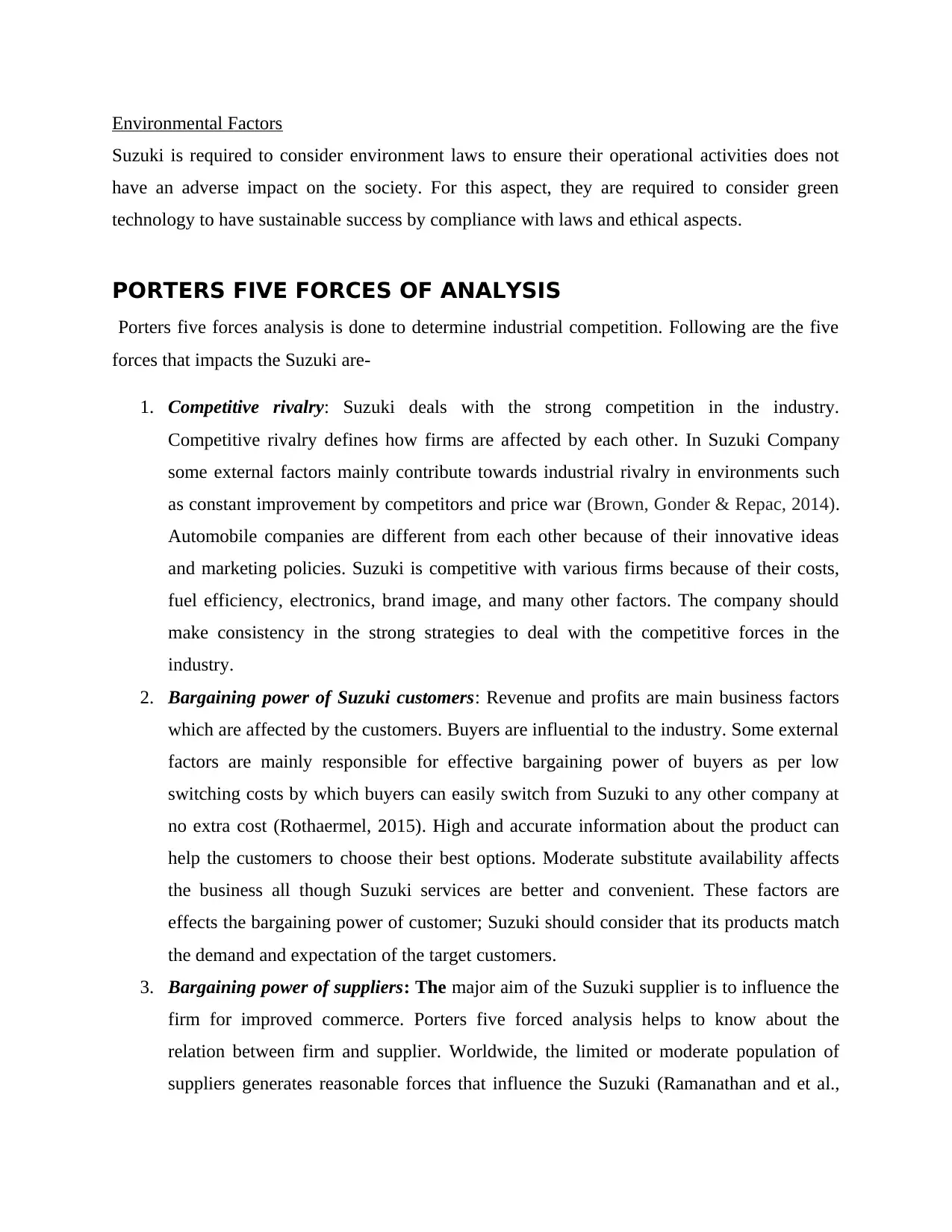
Environmental Factors
Suzuki is required to consider environment laws to ensure their operational activities does not
have an adverse impact on the society. For this aspect, they are required to consider green
technology to have sustainable success by compliance with laws and ethical aspects.
PORTERS FIVE FORCES OF ANALYSIS
Porters five forces analysis is done to determine industrial competition. Following are the five
forces that impacts the Suzuki are-
1. Competitive rivalry: Suzuki deals with the strong competition in the industry.
Competitive rivalry defines how firms are affected by each other. In Suzuki Company
some external factors mainly contribute towards industrial rivalry in environments such
as constant improvement by competitors and price war (Brown, Gonder & Repac, 2014).
Automobile companies are different from each other because of their innovative ideas
and marketing policies. Suzuki is competitive with various firms because of their costs,
fuel efficiency, electronics, brand image, and many other factors. The company should
make consistency in the strong strategies to deal with the competitive forces in the
industry.
2. Bargaining power of Suzuki customers: Revenue and profits are main business factors
which are affected by the customers. Buyers are influential to the industry. Some external
factors are mainly responsible for effective bargaining power of buyers as per low
switching costs by which buyers can easily switch from Suzuki to any other company at
no extra cost (Rothaermel, 2015). High and accurate information about the product can
help the customers to choose their best options. Moderate substitute availability affects
the business all though Suzuki services are better and convenient. These factors are
effects the bargaining power of customer; Suzuki should consider that its products match
the demand and expectation of the target customers.
3. Bargaining power of suppliers: The major aim of the Suzuki supplier is to influence the
firm for improved commerce. Porters five forced analysis helps to know about the
relation between firm and supplier. Worldwide, the limited or moderate population of
suppliers generates reasonable forces that influence the Suzuki (Ramanathan and et al.,
Suzuki is required to consider environment laws to ensure their operational activities does not
have an adverse impact on the society. For this aspect, they are required to consider green
technology to have sustainable success by compliance with laws and ethical aspects.
PORTERS FIVE FORCES OF ANALYSIS
Porters five forces analysis is done to determine industrial competition. Following are the five
forces that impacts the Suzuki are-
1. Competitive rivalry: Suzuki deals with the strong competition in the industry.
Competitive rivalry defines how firms are affected by each other. In Suzuki Company
some external factors mainly contribute towards industrial rivalry in environments such
as constant improvement by competitors and price war (Brown, Gonder & Repac, 2014).
Automobile companies are different from each other because of their innovative ideas
and marketing policies. Suzuki is competitive with various firms because of their costs,
fuel efficiency, electronics, brand image, and many other factors. The company should
make consistency in the strong strategies to deal with the competitive forces in the
industry.
2. Bargaining power of Suzuki customers: Revenue and profits are main business factors
which are affected by the customers. Buyers are influential to the industry. Some external
factors are mainly responsible for effective bargaining power of buyers as per low
switching costs by which buyers can easily switch from Suzuki to any other company at
no extra cost (Rothaermel, 2015). High and accurate information about the product can
help the customers to choose their best options. Moderate substitute availability affects
the business all though Suzuki services are better and convenient. These factors are
effects the bargaining power of customer; Suzuki should consider that its products match
the demand and expectation of the target customers.
3. Bargaining power of suppliers: The major aim of the Suzuki supplier is to influence the
firm for improved commerce. Porters five forced analysis helps to know about the
relation between firm and supplier. Worldwide, the limited or moderate population of
suppliers generates reasonable forces that influence the Suzuki (Ramanathan and et al.,
Paraphrase This Document
Need a fresh take? Get an instant paraphrase of this document with our AI Paraphraser
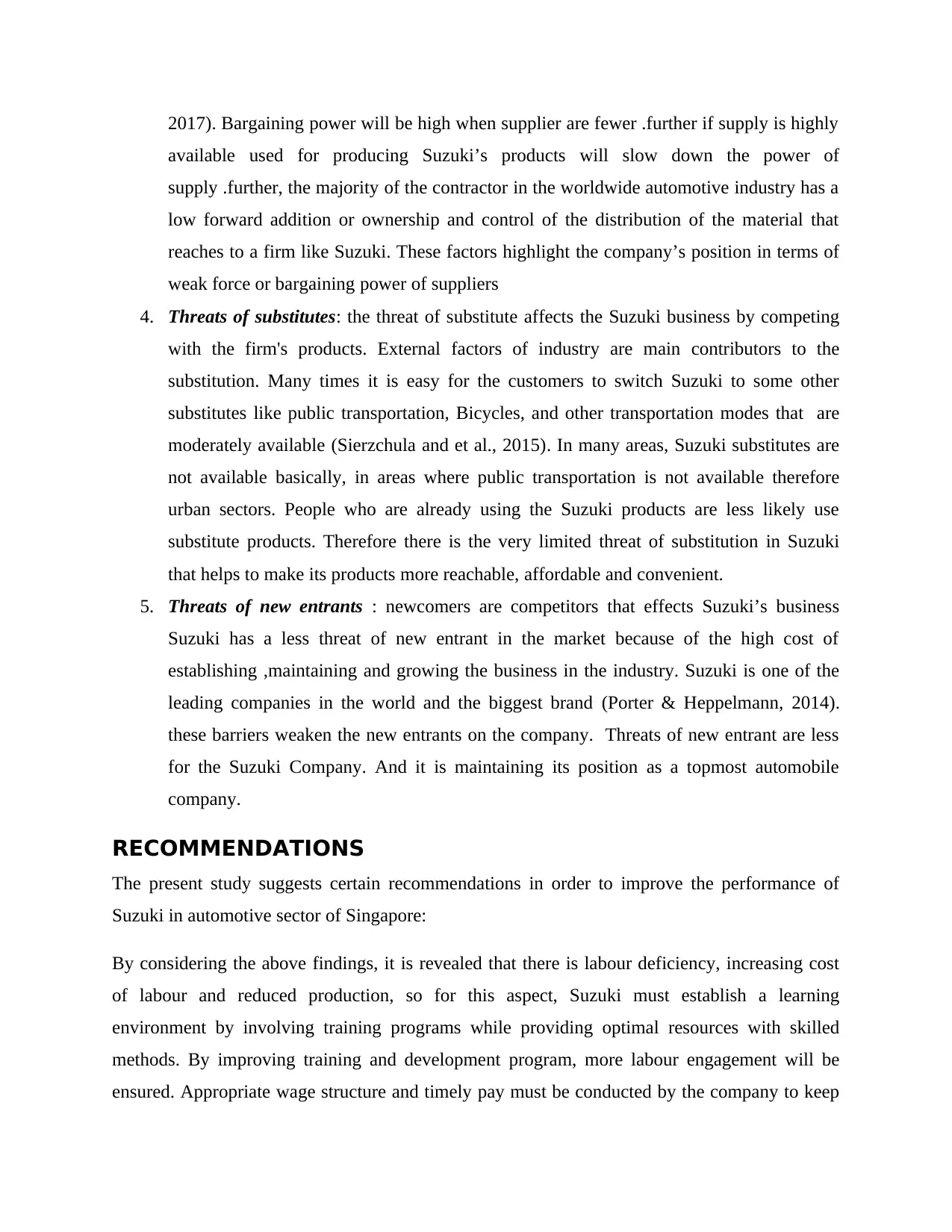
2017). Bargaining power will be high when supplier are fewer .further if supply is highly
available used for producing Suzuki’s products will slow down the power of
supply .further, the majority of the contractor in the worldwide automotive industry has a
low forward addition or ownership and control of the distribution of the material that
reaches to a firm like Suzuki. These factors highlight the company’s position in terms of
weak force or bargaining power of suppliers
4. Threats of substitutes: the threat of substitute affects the Suzuki business by competing
with the firm's products. External factors of industry are main contributors to the
substitution. Many times it is easy for the customers to switch Suzuki to some other
substitutes like public transportation, Bicycles, and other transportation modes that are
moderately available (Sierzchula and et al., 2015). In many areas, Suzuki substitutes are
not available basically, in areas where public transportation is not available therefore
urban sectors. People who are already using the Suzuki products are less likely use
substitute products. Therefore there is the very limited threat of substitution in Suzuki
that helps to make its products more reachable, affordable and convenient.
5. Threats of new entrants : newcomers are competitors that effects Suzuki’s business
Suzuki has a less threat of new entrant in the market because of the high cost of
establishing ,maintaining and growing the business in the industry. Suzuki is one of the
leading companies in the world and the biggest brand (Porter & Heppelmann, 2014).
these barriers weaken the new entrants on the company. Threats of new entrant are less
for the Suzuki Company. And it is maintaining its position as a topmost automobile
company.
RECOMMENDATIONS
The present study suggests certain recommendations in order to improve the performance of
Suzuki in automotive sector of Singapore:
By considering the above findings, it is revealed that there is labour deficiency, increasing cost
of labour and reduced production, so for this aspect, Suzuki must establish a learning
environment by involving training programs while providing optimal resources with skilled
methods. By improving training and development program, more labour engagement will be
ensured. Appropriate wage structure and timely pay must be conducted by the company to keep
available used for producing Suzuki’s products will slow down the power of
supply .further, the majority of the contractor in the worldwide automotive industry has a
low forward addition or ownership and control of the distribution of the material that
reaches to a firm like Suzuki. These factors highlight the company’s position in terms of
weak force or bargaining power of suppliers
4. Threats of substitutes: the threat of substitute affects the Suzuki business by competing
with the firm's products. External factors of industry are main contributors to the
substitution. Many times it is easy for the customers to switch Suzuki to some other
substitutes like public transportation, Bicycles, and other transportation modes that are
moderately available (Sierzchula and et al., 2015). In many areas, Suzuki substitutes are
not available basically, in areas where public transportation is not available therefore
urban sectors. People who are already using the Suzuki products are less likely use
substitute products. Therefore there is the very limited threat of substitution in Suzuki
that helps to make its products more reachable, affordable and convenient.
5. Threats of new entrants : newcomers are competitors that effects Suzuki’s business
Suzuki has a less threat of new entrant in the market because of the high cost of
establishing ,maintaining and growing the business in the industry. Suzuki is one of the
leading companies in the world and the biggest brand (Porter & Heppelmann, 2014).
these barriers weaken the new entrants on the company. Threats of new entrant are less
for the Suzuki Company. And it is maintaining its position as a topmost automobile
company.
RECOMMENDATIONS
The present study suggests certain recommendations in order to improve the performance of
Suzuki in automotive sector of Singapore:
By considering the above findings, it is revealed that there is labour deficiency, increasing cost
of labour and reduced production, so for this aspect, Suzuki must establish a learning
environment by involving training programs while providing optimal resources with skilled
methods. By improving training and development program, more labour engagement will be
ensured. Appropriate wage structure and timely pay must be conducted by the company to keep
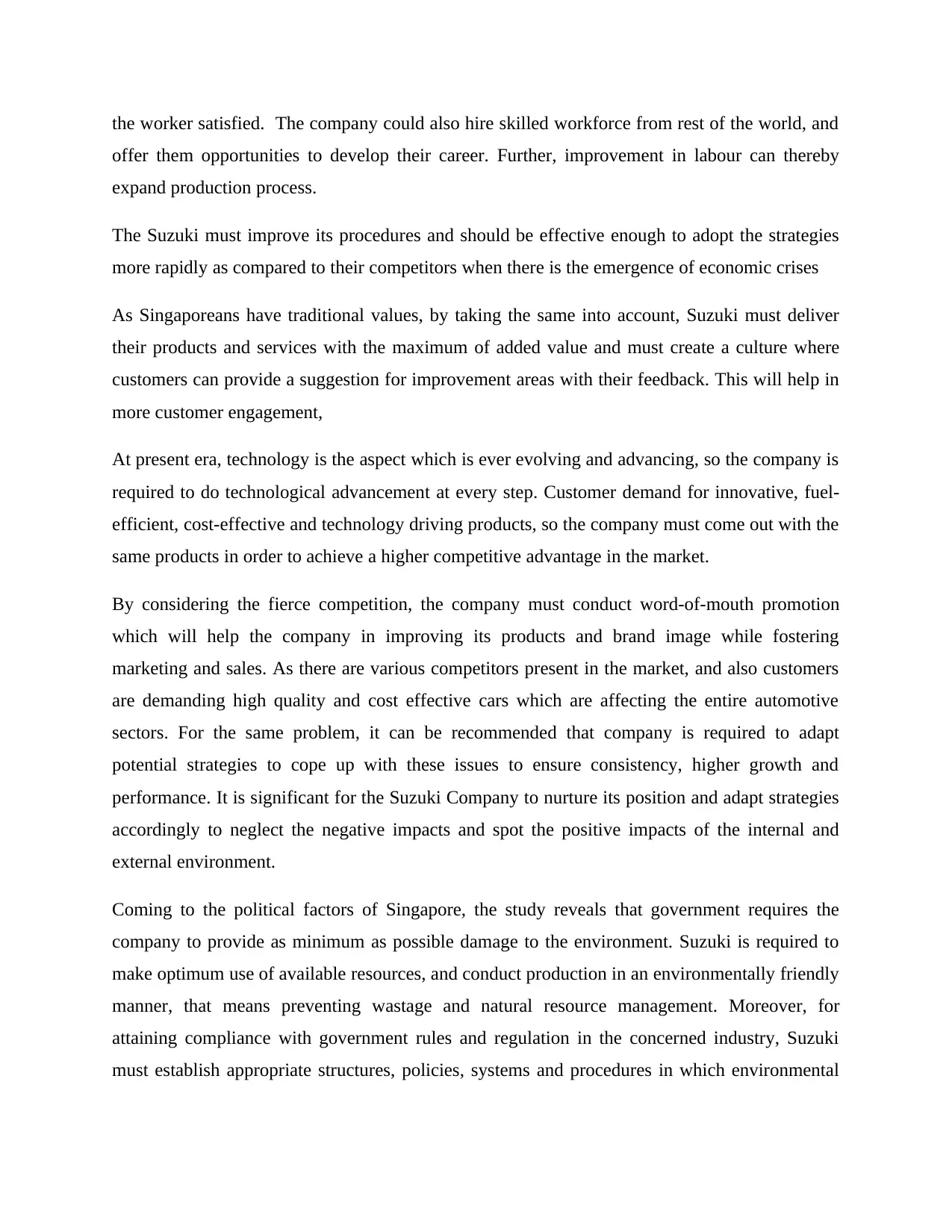
the worker satisfied. The company could also hire skilled workforce from rest of the world, and
offer them opportunities to develop their career. Further, improvement in labour can thereby
expand production process.
The Suzuki must improve its procedures and should be effective enough to adopt the strategies
more rapidly as compared to their competitors when there is the emergence of economic crises
As Singaporeans have traditional values, by taking the same into account, Suzuki must deliver
their products and services with the maximum of added value and must create a culture where
customers can provide a suggestion for improvement areas with their feedback. This will help in
more customer engagement,
At present era, technology is the aspect which is ever evolving and advancing, so the company is
required to do technological advancement at every step. Customer demand for innovative, fuel-
efficient, cost-effective and technology driving products, so the company must come out with the
same products in order to achieve a higher competitive advantage in the market.
By considering the fierce competition, the company must conduct word-of-mouth promotion
which will help the company in improving its products and brand image while fostering
marketing and sales. As there are various competitors present in the market, and also customers
are demanding high quality and cost effective cars which are affecting the entire automotive
sectors. For the same problem, it can be recommended that company is required to adapt
potential strategies to cope up with these issues to ensure consistency, higher growth and
performance. It is significant for the Suzuki Company to nurture its position and adapt strategies
accordingly to neglect the negative impacts and spot the positive impacts of the internal and
external environment.
Coming to the political factors of Singapore, the study reveals that government requires the
company to provide as minimum as possible damage to the environment. Suzuki is required to
make optimum use of available resources, and conduct production in an environmentally friendly
manner, that means preventing wastage and natural resource management. Moreover, for
attaining compliance with government rules and regulation in the concerned industry, Suzuki
must establish appropriate structures, policies, systems and procedures in which environmental
offer them opportunities to develop their career. Further, improvement in labour can thereby
expand production process.
The Suzuki must improve its procedures and should be effective enough to adopt the strategies
more rapidly as compared to their competitors when there is the emergence of economic crises
As Singaporeans have traditional values, by taking the same into account, Suzuki must deliver
their products and services with the maximum of added value and must create a culture where
customers can provide a suggestion for improvement areas with their feedback. This will help in
more customer engagement,
At present era, technology is the aspect which is ever evolving and advancing, so the company is
required to do technological advancement at every step. Customer demand for innovative, fuel-
efficient, cost-effective and technology driving products, so the company must come out with the
same products in order to achieve a higher competitive advantage in the market.
By considering the fierce competition, the company must conduct word-of-mouth promotion
which will help the company in improving its products and brand image while fostering
marketing and sales. As there are various competitors present in the market, and also customers
are demanding high quality and cost effective cars which are affecting the entire automotive
sectors. For the same problem, it can be recommended that company is required to adapt
potential strategies to cope up with these issues to ensure consistency, higher growth and
performance. It is significant for the Suzuki Company to nurture its position and adapt strategies
accordingly to neglect the negative impacts and spot the positive impacts of the internal and
external environment.
Coming to the political factors of Singapore, the study reveals that government requires the
company to provide as minimum as possible damage to the environment. Suzuki is required to
make optimum use of available resources, and conduct production in an environmentally friendly
manner, that means preventing wastage and natural resource management. Moreover, for
attaining compliance with government rules and regulation in the concerned industry, Suzuki
must establish appropriate structures, policies, systems and procedures in which environmental
⊘ This is a preview!⊘
Do you want full access?
Subscribe today to unlock all pages.

Trusted by 1+ million students worldwide
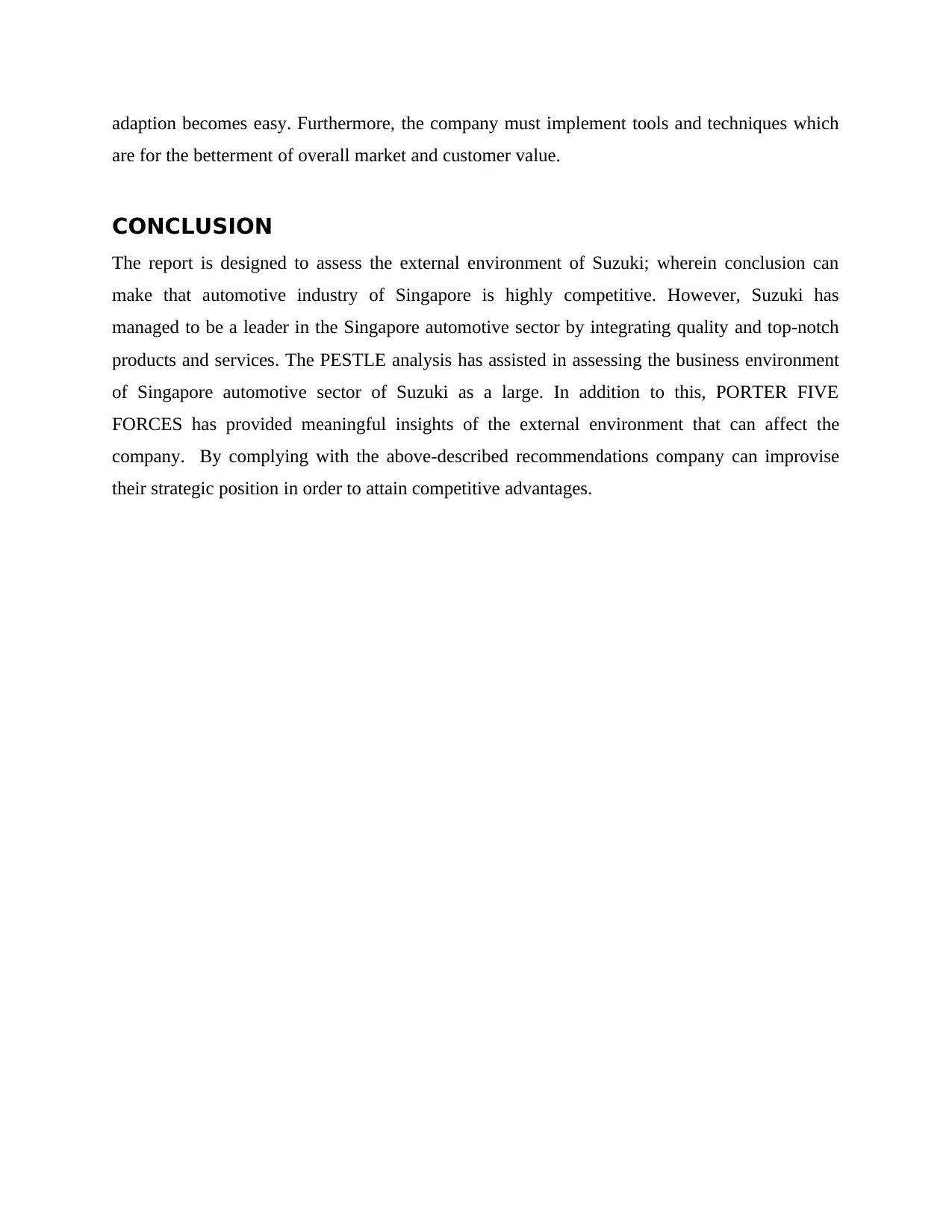
adaption becomes easy. Furthermore, the company must implement tools and techniques which
are for the betterment of overall market and customer value.
CONCLUSION
The report is designed to assess the external environment of Suzuki; wherein conclusion can
make that automotive industry of Singapore is highly competitive. However, Suzuki has
managed to be a leader in the Singapore automotive sector by integrating quality and top-notch
products and services. The PESTLE analysis has assisted in assessing the business environment
of Singapore automotive sector of Suzuki as a large. In addition to this, PORTER FIVE
FORCES has provided meaningful insights of the external environment that can affect the
company. By complying with the above-described recommendations company can improvise
their strategic position in order to attain competitive advantages.
are for the betterment of overall market and customer value.
CONCLUSION
The report is designed to assess the external environment of Suzuki; wherein conclusion can
make that automotive industry of Singapore is highly competitive. However, Suzuki has
managed to be a leader in the Singapore automotive sector by integrating quality and top-notch
products and services. The PESTLE analysis has assisted in assessing the business environment
of Singapore automotive sector of Suzuki as a large. In addition to this, PORTER FIVE
FORCES has provided meaningful insights of the external environment that can affect the
company. By complying with the above-described recommendations company can improvise
their strategic position in order to attain competitive advantages.
Paraphrase This Document
Need a fresh take? Get an instant paraphrase of this document with our AI Paraphraser
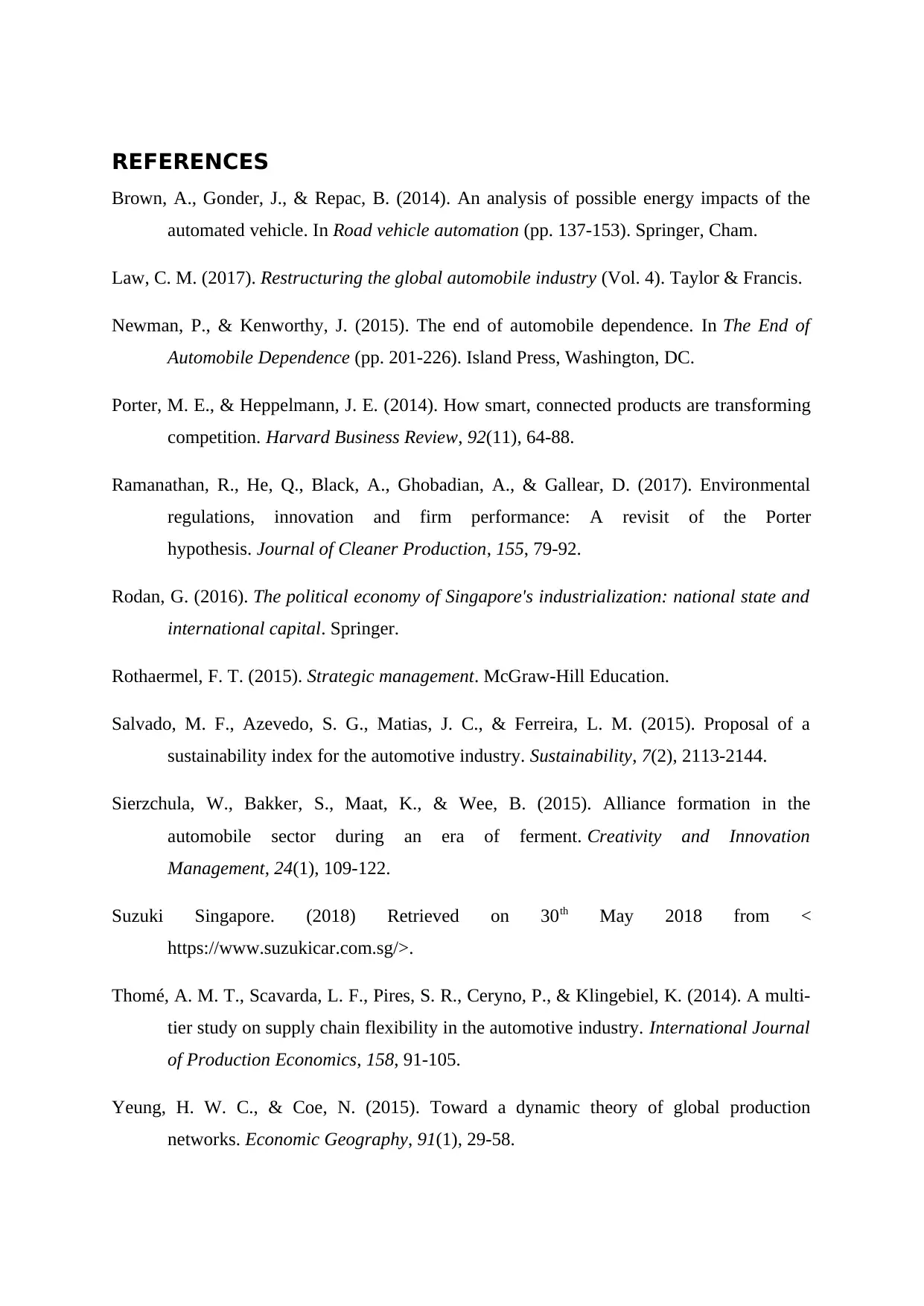
REFERENCES
Brown, A., Gonder, J., & Repac, B. (2014). An analysis of possible energy impacts of the
automated vehicle. In Road vehicle automation (pp. 137-153). Springer, Cham.
Law, C. M. (2017). Restructuring the global automobile industry (Vol. 4). Taylor & Francis.
Newman, P., & Kenworthy, J. (2015). The end of automobile dependence. In The End of
Automobile Dependence (pp. 201-226). Island Press, Washington, DC.
Porter, M. E., & Heppelmann, J. E. (2014). How smart, connected products are transforming
competition. Harvard Business Review, 92(11), 64-88.
Ramanathan, R., He, Q., Black, A., Ghobadian, A., & Gallear, D. (2017). Environmental
regulations, innovation and firm performance: A revisit of the Porter
hypothesis. Journal of Cleaner Production, 155, 79-92.
Rodan, G. (2016). The political economy of Singapore's industrialization: national state and
international capital. Springer.
Rothaermel, F. T. (2015). Strategic management. McGraw-Hill Education.
Salvado, M. F., Azevedo, S. G., Matias, J. C., & Ferreira, L. M. (2015). Proposal of a
sustainability index for the automotive industry. Sustainability, 7(2), 2113-2144.
Sierzchula, W., Bakker, S., Maat, K., & Wee, B. (2015). Alliance formation in the
automobile sector during an era of ferment. Creativity and Innovation
Management, 24(1), 109-122.
Suzuki Singapore. (2018) Retrieved on 30th May 2018 from <
https://www.suzukicar.com.sg/>.
Thomé, A. M. T., Scavarda, L. F., Pires, S. R., Ceryno, P., & Klingebiel, K. (2014). A multi-
tier study on supply chain flexibility in the automotive industry. International Journal
of Production Economics, 158, 91-105.
Yeung, H. W. C., & Coe, N. (2015). Toward a dynamic theory of global production
networks. Economic Geography, 91(1), 29-58.
Brown, A., Gonder, J., & Repac, B. (2014). An analysis of possible energy impacts of the
automated vehicle. In Road vehicle automation (pp. 137-153). Springer, Cham.
Law, C. M. (2017). Restructuring the global automobile industry (Vol. 4). Taylor & Francis.
Newman, P., & Kenworthy, J. (2015). The end of automobile dependence. In The End of
Automobile Dependence (pp. 201-226). Island Press, Washington, DC.
Porter, M. E., & Heppelmann, J. E. (2014). How smart, connected products are transforming
competition. Harvard Business Review, 92(11), 64-88.
Ramanathan, R., He, Q., Black, A., Ghobadian, A., & Gallear, D. (2017). Environmental
regulations, innovation and firm performance: A revisit of the Porter
hypothesis. Journal of Cleaner Production, 155, 79-92.
Rodan, G. (2016). The political economy of Singapore's industrialization: national state and
international capital. Springer.
Rothaermel, F. T. (2015). Strategic management. McGraw-Hill Education.
Salvado, M. F., Azevedo, S. G., Matias, J. C., & Ferreira, L. M. (2015). Proposal of a
sustainability index for the automotive industry. Sustainability, 7(2), 2113-2144.
Sierzchula, W., Bakker, S., Maat, K., & Wee, B. (2015). Alliance formation in the
automobile sector during an era of ferment. Creativity and Innovation
Management, 24(1), 109-122.
Suzuki Singapore. (2018) Retrieved on 30th May 2018 from <
https://www.suzukicar.com.sg/>.
Thomé, A. M. T., Scavarda, L. F., Pires, S. R., Ceryno, P., & Klingebiel, K. (2014). A multi-
tier study on supply chain flexibility in the automotive industry. International Journal
of Production Economics, 158, 91-105.
Yeung, H. W. C., & Coe, N. (2015). Toward a dynamic theory of global production
networks. Economic Geography, 91(1), 29-58.

⊘ This is a preview!⊘
Do you want full access?
Subscribe today to unlock all pages.

Trusted by 1+ million students worldwide
1 out of 9
Related Documents
Your All-in-One AI-Powered Toolkit for Academic Success.
+13062052269
info@desklib.com
Available 24*7 on WhatsApp / Email
![[object Object]](/_next/static/media/star-bottom.7253800d.svg)
Unlock your academic potential
Copyright © 2020–2025 A2Z Services. All Rights Reserved. Developed and managed by ZUCOL.




